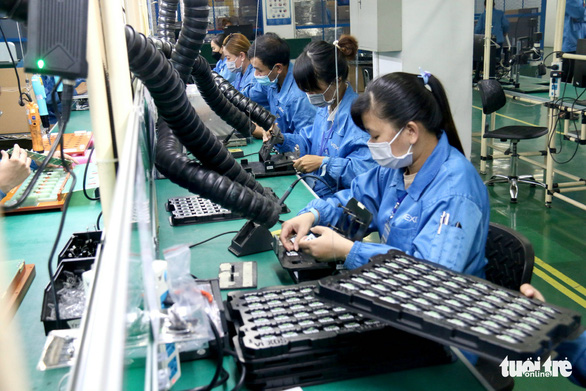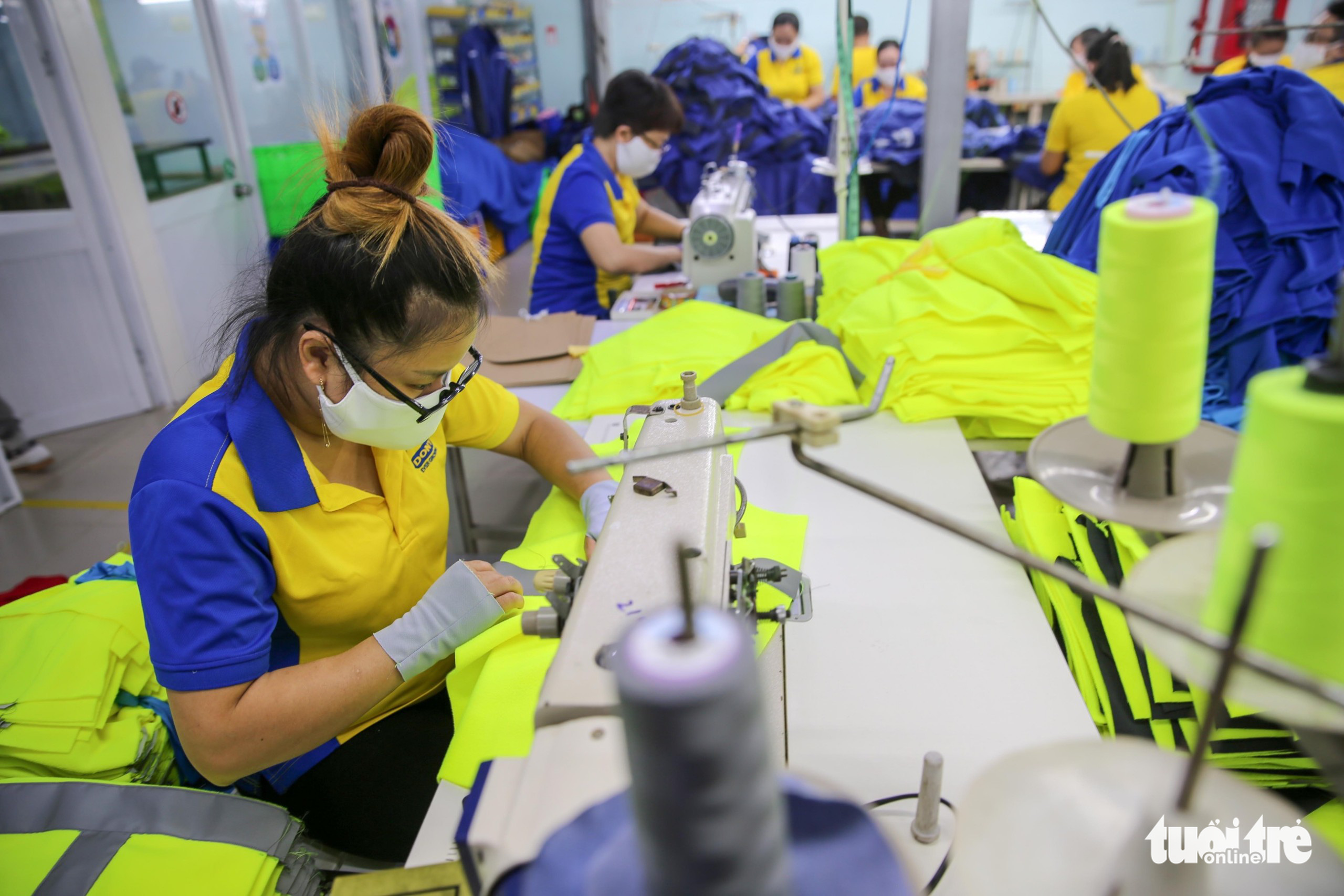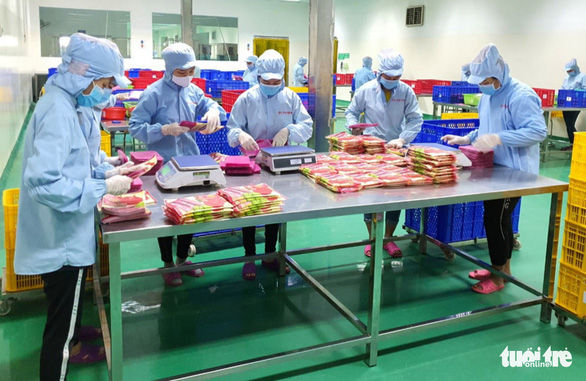Despite enjoying great benefits from the U.S. dollar’s appreciation over the Vietnam dong, many Vietnamese exporting enterprises, especially those in the footwear, textile-garment, and wood sectors, are facing a plunge in orders.
Many of these firms are downsizing or even suspending their production, and laying off their employees.
Many experts forecast the situation may last until 2023, so enterprises should prepare long-term response plans, quickly reduce production costs, and expand to more markets, especially stable ones with low inflation.
Concern over shutdown
Vu Hoang Minh, director of a leather shoe company in Ho Chi Minh City, said although his company has shrunk its workforce totaling 150 people by 20 percent, it seeks to cut the workforce by another 20 percent due to the severe shortage of orders.
“Over the past month, we have asked workers to take turns working, but costs have not fallen much. The salary budget of over VND1 billion [US$40,268] per month is a heavy burden when orders plunge by 40 percent,” Minh shared.
Nguyen Van Khanh, vice-chairman of the Shoes and Leather Association of Ho Chi Minh City, told Tuoi Tre (Youth) newspaper that many enterprises in the sector are facing high pressure due to the sharp fall in orders.
In particular, shoe and leather exports have tumbled by at least 30 percent compared with normal periods.
The U.S. and Europe, which import some 60-70 percent of Vietnam’s leather shoes, report a steep decline in imports as consumers there tighten their budgets.
“Many partners have suspended imports on account of their high inventories. Some have committed to resume the import after their inventories are sold out, but when they can sell out their inventories is unknown," Khanh added.
“These difficulties have forced many enterprises to produce in moderation.”
|
|
| Many textile and garment enterprises encounter difficulties due to a decline in exports. Photo: Q.Dinh / Tuoi Tre |
A representative of the Ho Chi Minh City Association of Garments, Textiles, Embroidery and Knitting shared the view, saying that orders were firm by September as contracts were concluded earlier.
In reality, the global market’s demand has fallen continuously since the end of July, especially in the U.S. and Europe.
“At this time in previous years, partners placed orders for the following year, but the number of orders for next year remains modest," the representative said.
“In the last quarter of this year and probably the first quarter of next year, the textile and garment sector will encounter multiple difficulties and many enterprises will likely see their orders halved.”
The representative added that a number of small enterprises with hundreds of laborers and below each may teeter on the verge of shutdown due to the lack of capital.
Similarly, the number of orders for many food and food products are also declining.
Bach Khanh Nhut, vice-chairman of the Vietnam Cashew Association, told Tuoi Tre that despite the higher dollar value, the global market’s demand has fallen by a minimum of 20-25 percent, causing the local cashew sector to face a gloomy period.
Due to the global political instability and high inflation, the consumption in large markets, such as the U.S. and Europe, which make up around 30 and 25 percent, respectively, of Vietnam’s cashew exports, have gone down.
Consumers are not spending on inessential commodities, such as cashew nuts.
Meanwhile, the export of cashew nuts to China, which accounts for a quarter of Vietnam’s cashew nut exports, has faced difficulties due to the COVID-19 pandemic as well.
“Despite benefits from the exchange rate, difficulties are more than advantages as orders tumble. The cashew sector will be dreary in the coming months as the selling prices will be hard to rise again," Nhut said.
"The difficulties may remain in place until next year if inflation does not go down.”
Meanwhile, a representative of the Vietnam Pepper Association said the falling demand sent pepper prices down by VND30,000 ($1.2) to VND56,500 ($2.3) per kilogram from earlier this year. This is the lowest price over the past year but it may slump further.
“High inflation and interest rates in many countries, especially the U.S., the largest importer of Vietnam’s pepper, have forced many customers to reduce pepper imports," the representative said.
“Meanwhile, the volume of pepper put up for sale has increased as many traders have sold off pepper, resulting in continuous pepper price falls.”
Regarding instant noodles and girdle cakes, a representative of Duy Anh Foods Import Export Company in Ho Chi Minh City said the export volume plummeted by some 30 percent compared with the best result last year. The sharpest decline was seen in the export volume to Europe.
“Due to the slow consumption, many partners have suggested delaying the reception of products, commonly by two to three months.”
Downsizing workforce, seeking new markets
According to Nguyen Van Khanh from the Shoes and Leather Association of Ho Chi Minh City, the reduction of costs is vital. Enterprises may consider downsizing their workforce or reducing laborers’ working hours by asking them to work in shifts and have weekends off.
In addition, companies should quickly seek new markets, such as Africa and the Middle East.
Nguyen Thi Tuyet Mai, deputy general secretary of the Vietnam Textile and Apparel Association, said with a population of 100 million people, the domestic market has potential and enterprises should take full advantage of it.
Moreover, markets with tax incentives, such as Europe, and neighboring markets, such as the Southeast Asian region, Japan, and South Korea, should be exploited.
“With appropriate access, local enterprises can deal with the order fall this year and get prepared for a possible increase in orders next year," Mai said.
“However, in the long term, they should enhance the automation in production to reduce costs and improve the competitiveness as customers are paying more attention to products’ prices."
|
|
| Food processing companies face pressure as their foreign partners’ demand falls. Photo: N.Tri / Tuoi Tre |
According to Dang Phuc Nguyen, general secretary of the Vietnam Fruit and Vegetable Association, enterprises should limit investments, scale down their operation, and prioritize goods in high demand and with competitive prices.
The U.S. and Europe have high and off seasons to import Vietnamese goods.
In addition, with products’ shelf life reaching two to three years, enterprises should pay attention to intensive processing to maintain production and diminish their reliance on buyers.
Many companies shut down factories, fire workers
At the end of October, many companies with 100 to more than 1,000 employees each announced the shutdown of their factories and give their employees the sack, citing the lack of orders.
Nguyen Ngoc Nhan, a 40-year-old worker of Ta Shuan Co. Ltd. in Tan Tao Industrial Park, said that his company has been closed from November 5 so workers are sluggish.
“I have worked for the company for 20 years. I thought everything would be stable after the COVID-19 pandemic, but now I get the sack and I do not know what to do next,” Nhan said.
Over the past three months, the company has not asked workers to work overtime but it has let them take weekends off and even work four days a week.
According to the notice of Ta Shuan Co. Ltd., its customers have suspended their operations and have not placed orders, so Ta Shuan has faced financial difficulties and asked its workers to take unpaid leave for three months.
Similarly, Footgearmex Footwear Co. Ltd. in Binh Tan District, Ho Chi Minh City has publicized the termination of labor contracts with nearly 1,200 employees from December 1 due to the shortage of orders. The company has adopted all possible solutions but failed to resolve its difficulties.
Striving to help workers
Cao Thi Huynh Giao, a worker of Vexos Vietnam Co. Ltd. at Tan Thuan Export Processing Zone in District 7, said that due to the decline in orders, she could not work overtime, so her monthly salary fell from VND9-10 million ($362-402) to more than VND6 million ($242).
However, Giao still has a job. Many other workers have lost their jobs as many companies have run down or suspended their production lines given the lack of orders.
Nguyen Huynh Thanh Son, deputy head of the company’s production team, said he manages four accessory assembly lines but only three lines are being operated.
Workers in the suspended line have to temporarily assume other tasks.
According to the company’s leaders, the decrease in orders and the lack of imported accessories have forced the factory to adjust its production and cut down overtime hours.
If any worker quits their job, the factory will pay them the basic salary for two months and employs them again when the number of orders increases.
The remaining workers will work overtime to improve their incomes.
Meanwhile, a representative of the Binh Duong Department of Labor, War Invalids, and Social Affairs on Wednesday told Tuoi Tre that among the 800,000 laborers working for enterprises with labor unions, up to 240,000 laborers, or 30 percent, must take Saturdays off or work every other day.
The situation, caused by the lack of orders, is seen at enterprises in wood processing, footwear, and apparel.
However, some enterprises have plans to scale down their production but still try to pay employees.
Chi Hung Co. Ltd. with about 10,000 laborers in Tan Uyen Town plans a suspension of eight days per month within three months, from this month to January 2023. The company will still give their employees severance pay of VND180,000 ($7.2) per day.
Shyang Hung Cheng Industrial Co. Ltd. in Thuan An City has a stoppage plan on six days per month starting this month. Some units of the company will not work for eight to 20 days per month.
Nevertheless, employees are still entitled to VND196,000 ($8) per day.
The Binh Duong Department of Labor, War Invalids, and Social Affairs will work with other departments and agencies to support enterprises and ensure employees’ benefits.
Like us on Facebook or follow us on Twitter to get the latest news about Vietnam!



















































